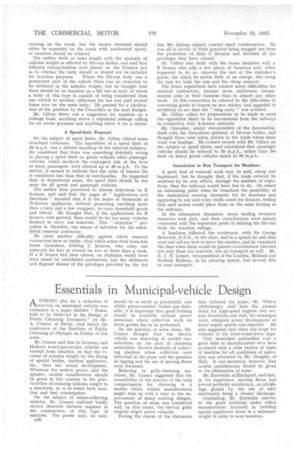Essentials in Municipal-vehicle Design
Page 46

If you've noticed an error in this article please click here to report it so we can fix it.
ASTRONG plea for a reduction of .taxation on municipal vehicles was contained in a paper entitled " Essentials to be Observed in the Design of Public Cleansing Transport," by Mr. A. Connor, of Derby, read before the conference of the Institute of Public Cleansing at Olympia on Friday of last week.
Mr. Connor said that in Germany and Holland municipal-service vehicles are exempt from taxation, so that the increase of unladen weight by the fitting of special bedies, dustless appliances, etc., does not retard development. Whatever the motive power, said the speaker, careful consideration should be given in this country to the practicability of reducing unladen weight to a minimum, so as to lessen both taxation and fuel consumption.
On the subject of refuse-collecting vehicles, Mr. Connor outlined briefly certain desirable features required in the construction of this type of machine. The power unit, he said, nal should be as small as practicable, and whilst power-assisted brakes are desirable, it is important that good braking should be available without power assistance where collection work on down grades has to be performed.
On the question of noise alone, Mr. Connor thought that the electric vehicle was deserving of careful consideration on the part of cleansing authorities. Several methods of achieving dustless refuse collection were described in the paper and the question of tipping and the use of moving floors were discussed.
Referring to gully-cleansing machines, Mr. Connor suggested that the accessibility of the interior of the tank compartments for cleansing is a matter which vehicle manufacturers might take up with a view to the improvement of many existing designs. The question of noise was considered and, on this count, the electric-gully emptier 'might prove valuable.
During the course of the discussion that followed the paper, Mr. Wilson (Edinburgh) said that the present trend for high-speed engines had certain drawbacks and that, for municipal work, adequate power development at lower engine speeds was required. He also suggested that there was scope for vehicles of the front-wheel-drive type.
That municipal authorities cwe great debt to manufacturers \via have produced such a wide variety of types of machine for all conditions of operation was advanced by Mr. Douglas, of Hull. It was necessary, however, that careful consideration should be given to the elimination of noise.
Mr. Entwistle, of Blackpool, said that, in his experience, moving floors had proved perfectly satisfactory, an advantage gained by the use of'su'ch mechanism being a cleaner discharge.
Concluding, Mr. Entwistle referred to the great handicap under which manufacturers laboured in building special appliances down to a minimum weight in order to save taxation.




















































































